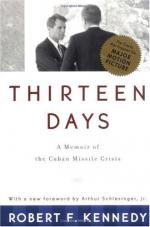
|
| Name: _________________________ | Period: ___________________ |
This test consists of 5 multiple choice questions, 5 short answer questions, and 10 short essay questions.
Multiple Choice Questions
1. Who was the ex-Chancellor of Germany at the outbreak of World War I?
(a) Prince von Bulow.
(b) Adolf Hitler.
(c) Joseph Stalin.
(d) Kristof Romanoff.
2. Who was approached by a Soviet Embassy official to offer a proposal for removing the missiles from Cuba?
(a) Robert.
(b) JFK.
(c) Sorensen.
(d) John Scali.
3. What two items were added to the embargo list after the successful boarding of the Marucla?
(a) Weapons and steele.
(b) Baby food and bread.
(c) Petroleum oil and lubricants.
(d) Gasoline and automobiles.
4. Who said "I am not going to follow a course which will allow anyone to write a comparable book about this time, The Missiles of October" (98)?
(a) Barbara Tuchman.
(b) Robert.
(c) JFK.
(d) Prince von Bulow.
5. Who would not allow Russian planes to refuel or land in Dakar?
(a) President Sekou Toure.
(b) The U.S. Navy.
(c) Fidel Castro.
(d) President Leopold Senghor.
Short Answer Questions
1. According to the Afterword, what did victory mean pre-1945?
2. What does Robert claim can "best be judged by conflict, by debate" (86)?
3. What did Dobrynin say the Cubans resented when Robert meets with him after the U-2 was shot down?
4. Who does JFK write to after the Russians agree to remove missiles from Cuba?
5. What is the crisis a microcosm for according to the authors of the Afterword?
Short Essay Questions
1. Why does Robert believe that a devil's advocate is necessary for the President?
2. Who did JFK seek advice from? Why?
3. While still in communications with Khrushchev, RFK writes that "both 'hawks' and 'doves' sensed that our combination of limited force and diplomatic efforts had been unsuccessful" (64). What do the symbolic terms "hawks" and "doves" stand for?
4. According to Robert, how did time before the crisis was publicized effect the President's decisions?
5. What is JFK referencing when he says that "we are now in an entirely new ball game" (74)? What has changed?
6. What is one example Robert provides of a devil's advocate working?
7. How was the official letter sent by the Soviets on October 27th different from the letter sent October 26th?
8. Why does Robert claim that "we cannot be an island even if we wished; nor can we successfully separate ourselves from the rest of the world" (94)?
9. How does an official from the Soviet Embassy deliver a message in an unorthodox manner? Why is it thought to be credible? What was the message?
10. What did RFK believe was wrong with the letter drafted by the State Department that was written in response to the letter received October 27th, and what did he suggest they write instead?
|
This section contains 1,280 words (approx. 5 pages at 300 words per page) |

|




